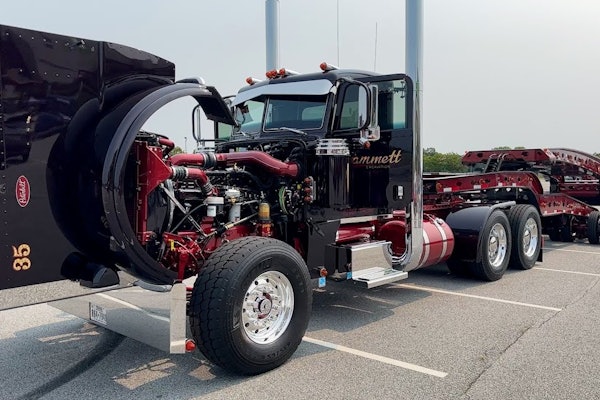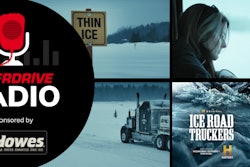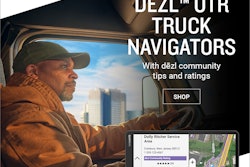The end of the year is an important time for organizing your financial affairs, examining your business and determining what your tax bite will be.
By the time you read this, you’ll have less than a month to get your financial house in order or to continue the smart planning you’ve engaged in throughout the year and gather your records for tax preparation.
This year it’s been especially important to stay on top of your finances. Freight is down, business is tough and income is harder to come by. Every receipt you can find, every expense dollar you paid, will help reduce your tax bill. If this has been a good year despite all odds, you can use this month to search for ways to cut your taxes and get ready for next year, which might not be as profitable. If you have struggled this year and are considering your options, use this time to talk with your tax adviser to set up a plan to keep you going. You may be overlooking financial moves that could mean the difference between staying in business and not. Either way, you don’t have time to waste.
Financial affairs
Pull out your budget. Are you having the kind of year you budgeted for? Ask yourself why you didn’t make the money you thought you’d make, says Eric Cook, owner of Peak Trucking Consultants. Are your expenses higher than predicted? Frank answers to these questions will help you do a better job in 2009.

If you don’t follow a budget, now’s the time to start one, whether you’re an owner-operator or company driver. Sit down with your spouse or tax adviser or both and put together a budget for the coming year. It’ll take an hour or so to create one and an hour a month to update it, says Russell Fullingim, president of Truckers Financial Service. “Truckers have time to do this,” he says. “You can also go on the Internet and find programs that can help you.”
Mark Miller, tax manager at owner-operator business services firm ATBS, says there’s a correlation between keeping a budget and profit-and-loss statement and success as an owner-operator. “You put the work in, you put in the discipline, you’re more successful,” he says.
Owner-operators, if the road has been tough this year, gather all your paperwork and look at your profit-and-loss statement to see where you could make improvements. Cook says this is a time for hard questions: Why am I not generating more revenue? Are my expenses too high? An outside consultant might be able to help you identify the areas that will improve your business.
“You can look at your cash flow and decide what bills you can put off, which you need to pay now and which you can postpone until you get back on your feet,” Cook says. “You might look at a restructuring of your business, maybe talk with creditors like your credit-card company or see if you can refinance your house to go from an adjustable-rate mortgage to a fixed-rate mortgage. If you’ve been putting money in an escrow account and you’re struggling to make your house payment, that’s maybe something you can put off for a couple of months.”
You have to set priorities in your spending. Fullingim says he has clients who are in danger of losing their homes, and part of the problem is they are spending too much money in some other areas. One client in this predicament is spending more than $1,100 each month on two personal vehicles.
December is a good time to assess your retirement planning. Many truckers, especially owner-operators, aren’t putting anything aside for retirement. Others aren’t contributing the maximum to their retirement accounts, whether an individual retirement account or a 401(k). And many truckers are operating without health insurance for either themselves or their families. “They need to put money in a retirement plan and a medical plan,” Fullingim says.
He reminds owner-operators that you can set up a solo 401(k) in your business, setting aside a maximum of $50,000, depending on your age, which is tax-deferred. You can set up an account for your spouse if he or she is involved in the business. As with an IRA, you can make contributions to a 401(k) as late as next April 15, but the account must be established by the end of this year. You could open an account with, say, $500 and make additional contributions until April 15 for the 2008 tax year. If you’re already in a retirement account, contribute as much as you can afford.
“Looking to the future, when do you want to retire?” Fullingim asks. “You don’t want to be driving a truck when you’re 70 years old.”
Medical coverage is tougher to find if your carrier doesn’t offer a plan. If you’re an owner-operator, you might join the National Federation of Independent Business or the National Association for the Self-Employed, two groups with relatively low-cost options for getting medical coverage. The Owner-Operator Independent Drivers Association also has a plan for both owner-operators and company driver members. If your spouse is employed, see if you can get coverage through that plan, even if you have to pay a premium, Fullingim says. Your state of residence may offer a plan for those not covered elsewhere.
Fullingim has even counseled several of his owner-operator clients to forgo their independent status and hire on with a carrier that has good retirement and health care benefits. If you can’t put anything aside for your future or your current health, you, too, might want to sign on with a carrier. Those opportunities may be thinning, but it could be worth a look.
If you’re nearing retirement, Fullingim suggests visiting the Social Security website to see how much you’ll receive at different ages. If you’re an owner-operator, you have to put money into the system to get money back when you retire. If you’re a company driver, it will tell you how much you’ve earned and how much you’re likely to get. “I have one client who retired from a company with over $300,000 in his 401(k) [because he wanted] to become a truck driver,” Fullingim says. “When he’s ready to retire, he’ll have a good retirement. I’m trying to convince him to pay more money into his retirement plan [to increase what he has]. I also have a couple of clients who are over 70. They should not be driving.”
This time of year also is good for evaluating your business structure. If you’re a sole proprietor, you might want to consider incorporating. The paperwork is less and the tax filing is easier as a sole proprietor, but you may face legal implications if you mingle your personal and business assets. Incorporating separates those assets but is more expensive because of higher banking costs, tax fees and payroll expenses. A corporation also is more complicated at tax time and requires greater business awareness on your part.
For those who have a Section 125 flexible spending account, check if you’ve spent all of the funds in the account before the year closes. IRS regulations say you will forfeit anything not spent and it will go to the plan’s administrator for expenses. “You don’t want to be stuck with money in your account,” says Kevin Rutherford, ATBS tax consultant and radio commentator.
Owner-operators, take this time to inspect your insurance coverage. “One of the big areas drivers don’t understand is physical damage insurance on their truck,” Rutherford says. “Physical damage insurance is priced to the value of your truck. If your truck is damaged, you’re not going to get the amount you had it insured for when you bought it. I recommend every six months you review the truck value and insurance. At the same time, ask your agent to review all of your coverages.”
For company drivers and owner-operators, use the end of the year to whittle down credit card debt. By paring down your debt, you will save money on interest and enhance your credit score. Many credit-card companies are raising rates and slicing lines of credit. By freeing up card balances, you will be in a better position if you need to use a card in an emergency.
Taxes
If you don’t have an organized system for keeping receipts, especially work-related ones, now’s an ideal time to set one up. Buy a file box or expanding folder or manila folders and labels for your briefcase – these are deductible – for keeping your receipts in your truck. When you get home, transfer the receipts to your permanent files.
ATBS’ Miller emphasizes that every receipt or report is important to keep. “For every dollar in expenses you find, it’s 25 cents less in taxes you have to pay,” he says.
If you’re an owner-operator, most of what you spend on the job is deductible. That includes the $550 heavy-duty vehicle excise tax, which many truckers overlook each year, Fullingim says. Keep a record of how many days you’re on the road to calculate your per-diem and oil changes and other maintenance expenses, he says.
That refrigerator and microwave you put in your truck this year to prepare meals is deductible, Miller says. If you don’t have one, he adds, buy one: You’ll save money and eat healthier.
Peak’s Cook says company drivers can take business deductions, too. “Make sure you keep receipts for any expenses you weren’t reimbursed for by your employer, such as work boots or a uniform,” he says.
When it comes to tax planning for owner-operators, Rutherford says the most important action you can take is to do a “tax review.” He says most people think of tax season as January 1 to April 15, but a year-end review will tell you where you stand now so you’ll know whether an operational or purchasing decision needs to be made before the end of the year.
Collect your reports and receipts from the first half of the year and go over them with your tax preparer, who will have more time to meet with you now than early next year. “If the second half of the year will be similar to the first half, you’ll be able to come up with a number [tax you might owe],” Rutherford says. “Problem with most owner-operators is that the amount of tax they pay from year to year varies wildly. I’ve had a client owe $25,000 in tax one year and zero the next.”
If your review tells you that you’re going to have a hefty tax bill, you’ll want to move up deductions. Take a look at purchases you’ll need in the next few months, and if you’ve got the cash on hand, make them this month. If you’ll be ready for new tires in the first quarter of 2009, buy them now and ask your dealer to store them until changeover, Rutherford recommends. If you’ve been thinking about getting an auxiliary power unit to save on fuel, buy it now for the deduction.
Fullingim points out that you’ll get a full year’s depreciation if you buy a new truck or trailer in December. The same goes for repairs. If you’re going to need to replace a clutch or a transmission soon, you might want to take care of it this month. Extensive repairs normally can be depreciated over several years, or they can be accelerated into a tax year. That’s especially true this year with the federal Economic Stimulus Act of 2008, which increases the first-year depreciation of new equipment to 50 percent from 30 percent and the amount of the one-time expense you can deduct to $250,000 from $128,000, ATBS’ Miller says.
Be smart, however. Miller says to make purchases you need but “don’t spend money just to buy tax














